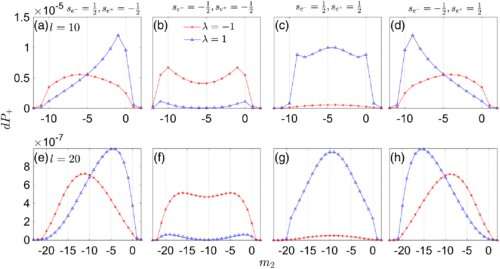Four channels of the OAM spectrum for positrons when the photon polarization is varied between λ=1 (blue) and λ=−1 (red). Here, the photon TAM is (a)–(d) l=10 and (e)–(h) l=20. Credit: DOI: 10.1103/PhysRevD.104.076025
Recently, researchers from Shanghai Institute of Optics and Fine Mechanics (SIOM) of the Chinese Academy of Sciences (CAS) have made progress in the angular momentum properties of quantum vortex scattering and the manipulation of the quantum states of high-energy particles. The findings were published in Physical Review D and Physical Review Research.
It is well known that, in quantum field theory established in the 1940s, the field quantization is usually performed by expanding fields with the basis of plane waves. This theoretical framework has achieved great success in high-energy particle physics in the past 70 years. Nonetheless, the angular momentum properties in the high-energy scattering process have never been self-consistently solved, because the plane waves do not carry the intrinsic orbital angular momentum (OAM).
On the other hand, the vortex light and particle beams have been the research hot topics for 30 years. However, all the experimental schemes of generating, detecting, and manipulating the vortex beams are only applicable to the low-energy particles. The experimental generation and manipulation of high-energy vortex particles are still challenging as their wavelength is orders of magnitudes smaller.
Based on the theory of quantum electrodynamics (QED), researchers performed the field quantization with the basis of quantum vortex states (Bessel modes), and developed a complete theory to describe the high-energy vortex scattering. The quantum vortex states carry well-defined intrinsic OAM, thus this theory can satisfactorily solve the angular momentum conservation, conversion, and spin-orbit interaction in the QED vortex scattering.
Compared with that of the plane-wave scattering, the momentum spectrum of vortex scattering is significantly broadened because the resonance strictly determined by four-momentum conservation is replaced by the conservation of energy and longitudinal momentum. More importantly, for the first time, the new theory gives the OAM spectrum for the vortex scattering process.
Additionally, researchers proposed a new scheme of generating the high-energy vortex positron beam with intrinsic OAM via Beth-Heitler process, and then developed a new mechanism of manipulating the quantum states of high-energy particles based on the vortex scattering process.
More information: Zhigang Bu et al, Twisted Breit-Wheeler electron-positron pair creation via vortex gamma photons, Physical Review Research (2021). DOI: 10.1103/PhysRevResearch.3.043159
Shaohu Lei et al, Generation of relativistic positrons carrying intrinsic orbital angular momentum, Physical Review D (2021). DOI: 10.1103/PhysRevD.104.076025
Journal information: Physical Review D
Provided by Chinese Academy of Sciences























